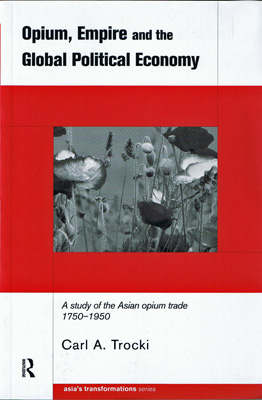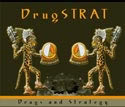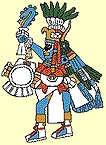Opium, Empire and the Global Political Economy
A study of the Asian opium trade, 1750-1950
Carl A. Trocky *
Routledge
London and New York, 1999 (reprinted in 2005)
ISBN 0-415-21500-5

Back cover:
What is the link between opium, imperialism and capitalism? Was the British Empire built on opium? And what can the nineteenth-century drug trade tell us about the Asian heroin traffic today?
Carl A. Trocki answers all these questions in his fascinating history of the great imperial drug trade of the nineteenth century: the British-Indian opium trade. The book brings together for the first time nearly fifty years of scholarship and research on opium trafficking, addiction, and other studies on drugs, the economy and human society. Opium, Empire and the Global Political Economy raises provocative questions about the historical relationship between opium, capitalism and European imperialism in Asia.
Opium needs to be considered in its role as an economic commodity, and seen in the context of other “drug” trades, including sugar, tea, alcohol and tobacco. Trocki’s evidence convincingly suggests that European imperialism, and the creation of a global economy, relied heavily on these great drug trades. All reoriented labor, land and capital in the service of commodity production and usually involved “industrial” modes of production. In order to serve these trades, systems of international exchange – such as shipping lines and banking – were brought into existence. They created the first great mass consumer markets, first in Europe and then, with opium, in Asia. Opium, Trocki argues, facilitated important elements in the European imperial advance through Asia, and was equally a fiscal support for virtually all of the new Asian states.
Contents
Introduction
1. The dream of empire
2. All the drowsy syrups of the world
3. Cleverer than alchemists
4. In compassion to mankind
5. The most gentlemanlike speculation
6. In the hands of Jews and Armenians
7. A matter of considerably greater solicitude
8. The most long-continued and systematic international crime
Appendix 1. The literature of the opium trade
Appendix 2. A comment on the Jardine Matheson “Opium Circulars”
Appendix 3. Englebert Kaempfer’s comments on opium from his “Amoenitatum Exoticarum”
Appendix 4. The economics of Malwa opium cultivation
Glossary
Notes
Bibliography
Index
*Carl A. Trocky is well known for his work in this area. He is the author of Prince of Pirates: The Temengongs and the Development of Johor and Opium and Empire: Chinese Society in Colonial Singapore 1800-1910, and is Professor of Asian Studies and Director of the Centre for Community and Cross-Cultural Studies at the Queensland University of Technology (Australia).

